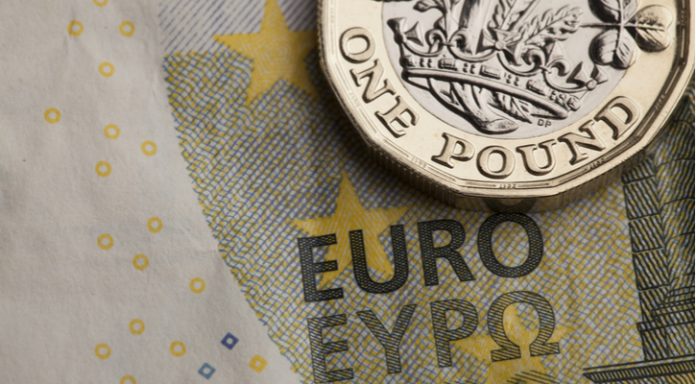Brexit optimism sent the pound charging higher versus the euro on Wednesday and in trading overnight. The pound euro exchange rate hit a high of €1.1345, its highest rate in over a week.
| What do these figures mean? |
|---|
When measuring the value of a pair of currencies, one set equals 1 unit and the other shows the current equivalent. As the market moves, the amount will vary from minute to minute. For example, it could be written: 1 GBP = 1.13990 EUR Here, £1 is equivalent to approximately €1.14. This specifically measures the pound’s worth against the euro. If the euro amount increases in this pairing, it’s positive for the pound. Or, if you were looking at it the other way around: 1 EUR = 0.87271 GBP In this example, €1 is equivalent to approximately £0.87. This measures the euro’s worth versus the British pound. If the sterling number gets larger, it’s good news for the euro. |
The pound rallied across the previous session as investors cheered comments from both the UK and Brussels that a Brexit deal is in sight. Brexit secretary Dominic Raab told ministers that he was confident a deal could be reached by 21st November. This would confirm that Britain is looking to conclude the deal at a special European Council meeting in mid-November. Following this timetable, UK Prime Minister Theresa May would be able to seek approval for the package from MP’s before Christmas.
This is not the first time that pound investors have heard that a deal is in sight. However, this is the first time that the Brexit secretary has sounded certain enough to put a date. The pound rallied as a softer more orderly Brexit is more widely believed to be less damaging for the UK economy.
| Why is a “soft” Brexit better for sterling than a “hard” Brexit? |
|---|
| A soft Brexit implies anything less than UK’s complete withdrawal from the EU. For example, it could mean the UK retains some form of membership to the European Union single market in exchange for some free movement of people, i.e. immigration. This is considered more positive than a “hard” Brexit, which is a full severance from the EU. The reason “soft” is considered more pound-friendly is because the economic impact would be lower. If there is less negative impact on the economy, foreign investors will continue to invest in the UK. As investment requires local currency, this increased demand for the pound then boosts its value. |
News that a deal has been reached regarding UK financial services also gave the pound a leg higher overnight. Reports indicate that a deal has been agreed that will give the UK financial services companies access to European markets after Brexit. Given the importance of the financial services to the UK economy, this is very good news.
Today investors will turn their attention to the Bank of England’s (BoE) super Thursday. This is when the central bank releases its monetary policy rate decision, quarterly inflation report and minutes from the BoE meeting. The central bank is not expected to change the interest rate. However, any changes in economic projections and the tone of the report could impact on the pound.
Euro Slips On Growth Concerns
The euro was broadly out of favour despite inflation ticking higher. Core inflation, which excludes more volatile items such as food and fuel, ticked higher in October to 1.1% year on year, up from 0.9% the previous month. Inflation remained steady at 2.2%. Higher inflation would usually encourage a central bank to raise interest rates.
However, euro traders were instead focusing on weak German retail sales. Analysts had been expecting German retail sales to grow 1% year on year. Instead, the unexpectedly declined -2.6% year on year in September. This was the sharpest decline in sales in 5 years and added to fears that the long boom period in Europe’s largest economy was coming to an end.
| Why does poor economic data drag on a country’s currency? |
|---|
| Slowing economic indicators point to a slowing economy. Weak economies have weaker currencies because institutions look to reduce investments in countries where growth prospects are low and then transfer money to countries with higher growth prospects. These institutions sell out of their investment and the local currency, thus increasing supply of the currency and pushing down the money’s worth. So, when a country or region has poor economic news, the value of the currency tends to fall. |
This publication is provided for general information purposes only and is not intended to cover every aspect of the topics with which it deals. It is not intended to amount to advice on which you should rely. You must obtain professional or specialist advice before taking, or refraining from, any action on the basis of the content in this publication. The information in this publication does not constitute legal, tax or other professional advice from TransferWise Inc., Currency Live or its affiliates. Prior results do not guarantee a similar outcome. We make no representations, warranties or guarantees, whether express or implied, that the content in the publication is accurate, complete or up to date. Consult our risk warning page for more details.
This article was initially published on TransferWise.com from the same author. The content at Currency Live is the sole opinion of the authors and in no way reflects the views of TransferWise Inc.





